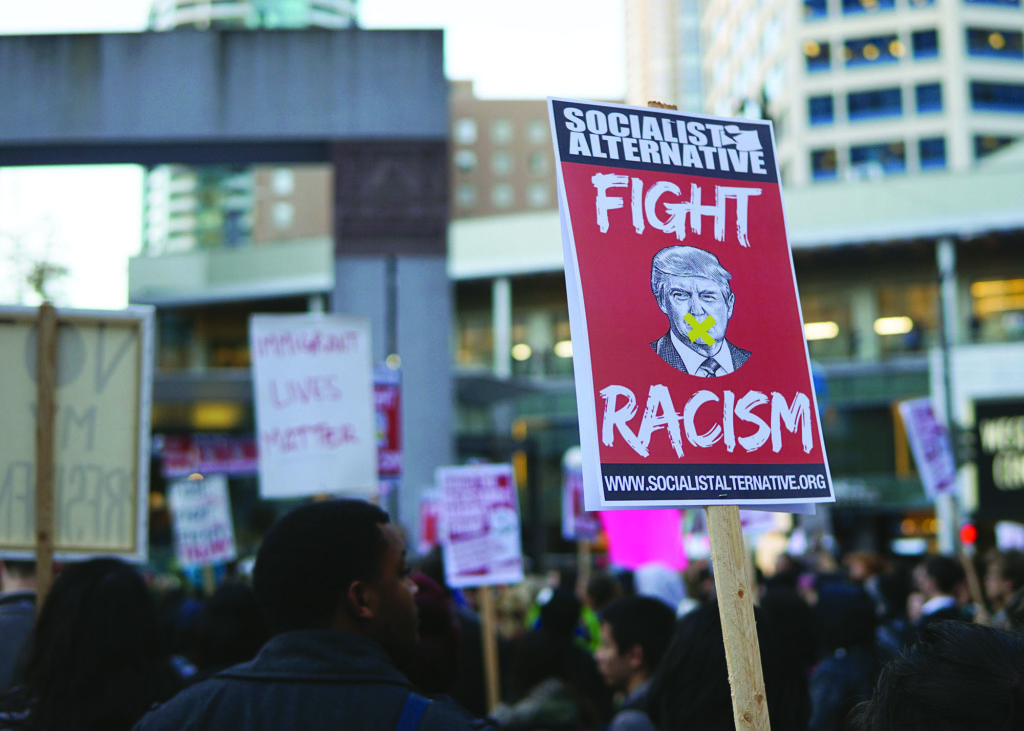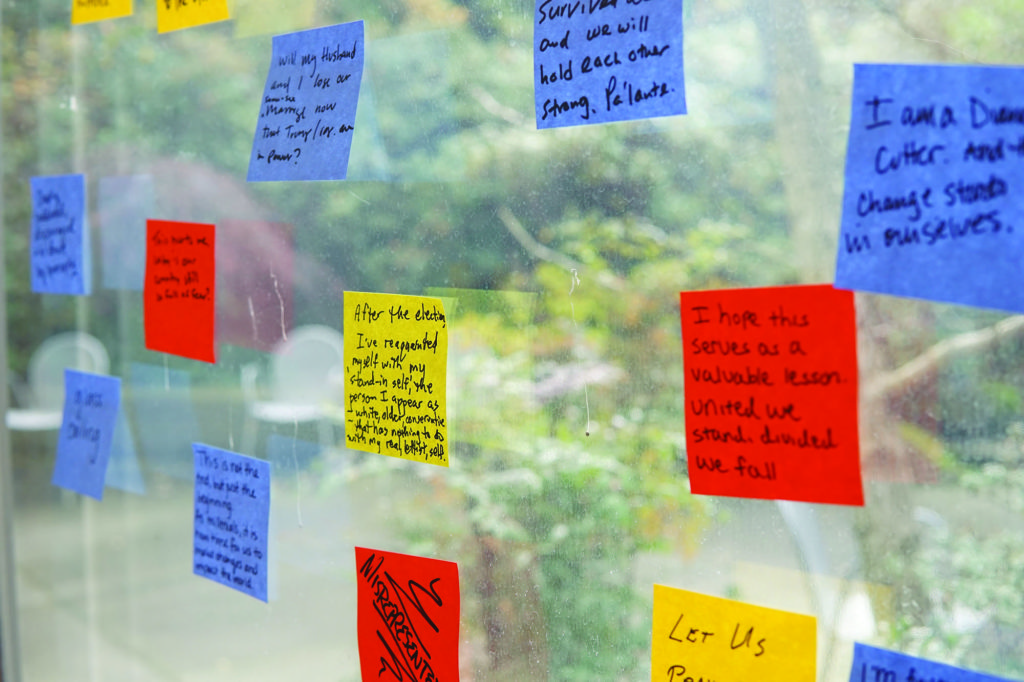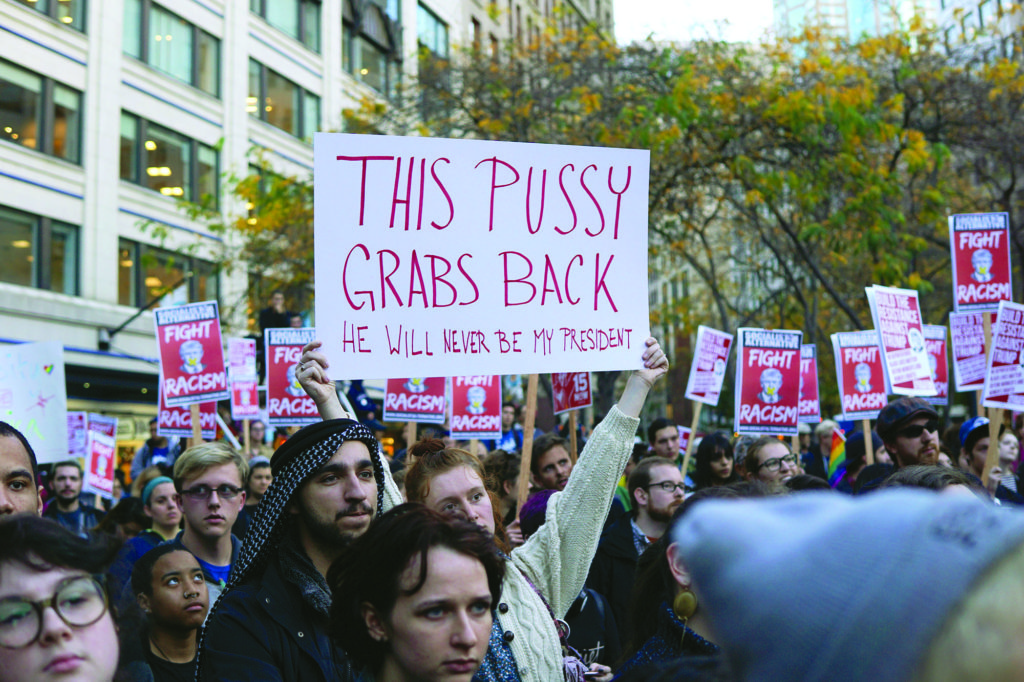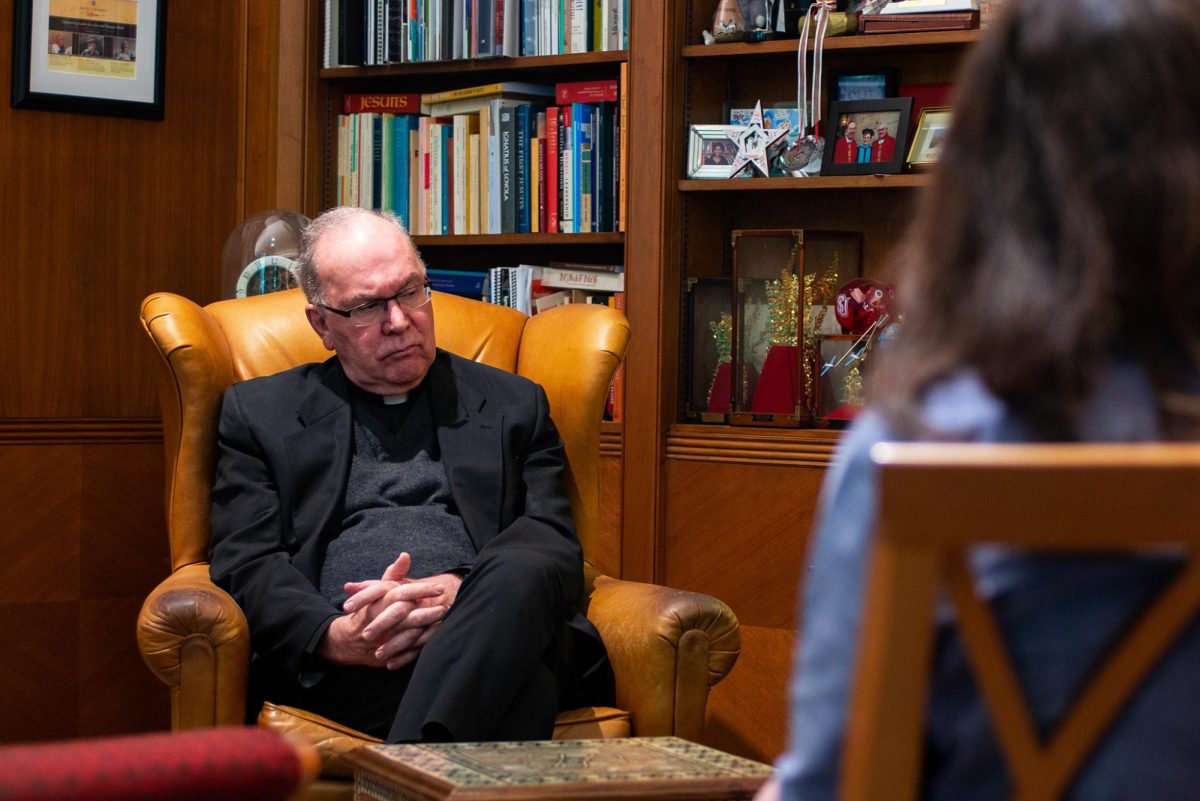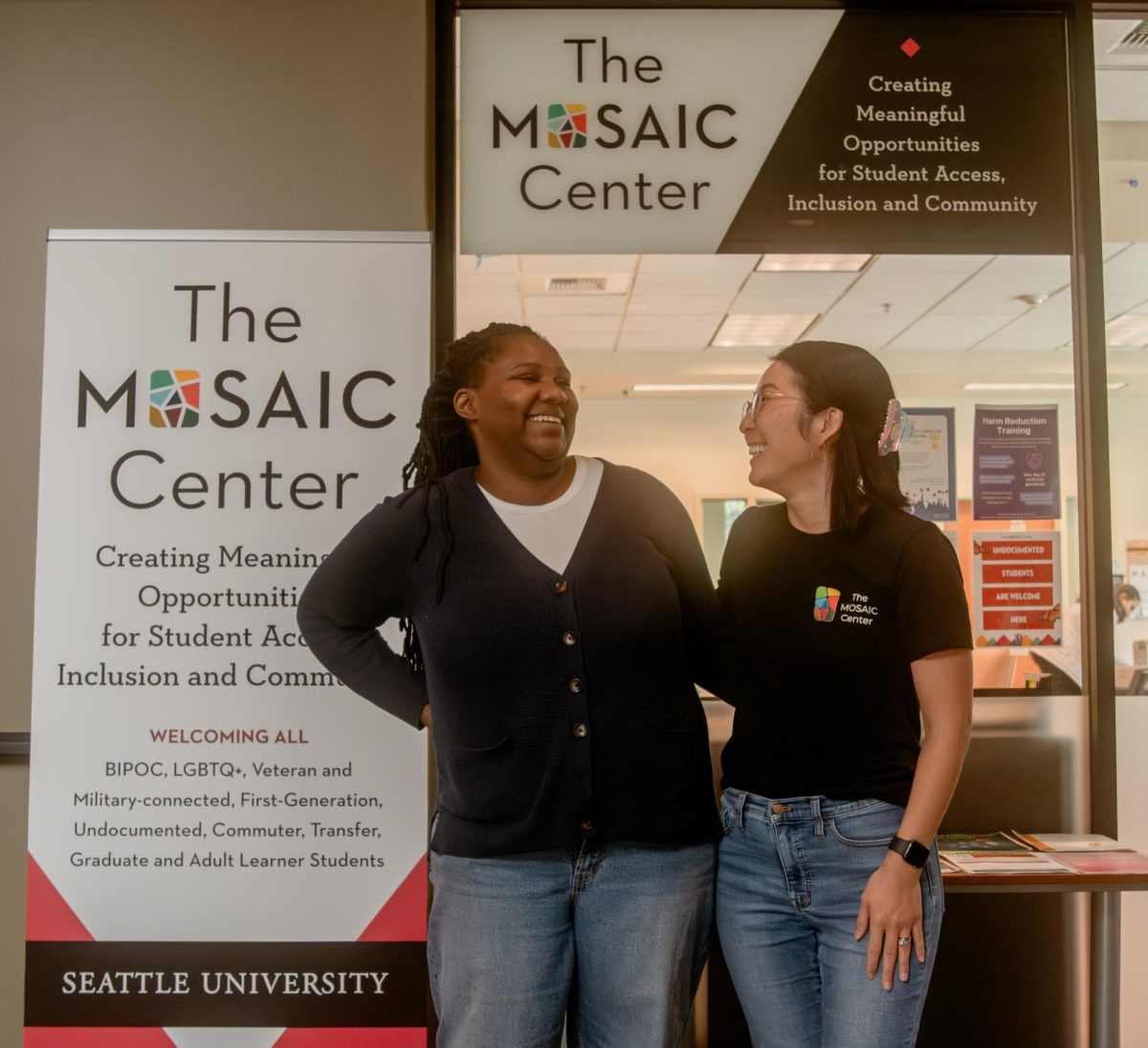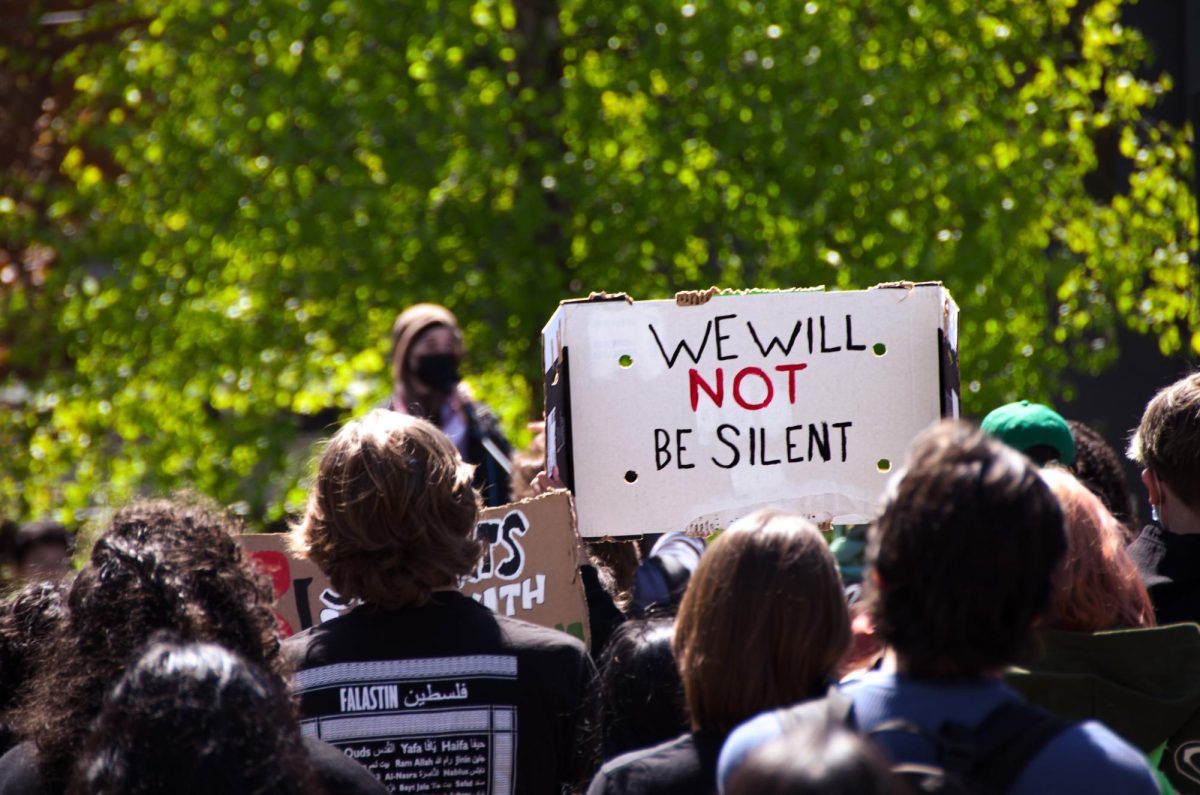What a year it’s been.
In January the world was deprived of David Bowie and Muhammad Ali, March brought us the fifth anniversary of the Syrian war and, in June, the citizens of the United Kingdom voted to leave the European Union. And on Nov. 8, we elected a new president.
Much has changed since then. But at the same time, much remains the same.
“I wish more people would truly listen to each other.”
“I am scared and sad, and I don’t want to be.”
“I really wanted to see the first female President in the White House.”
“I feel betrayed by my country.”
“As a woman, I am terrified of what lies ahead.”
“I am in mourning for democracy.”
“United we stand, divided we fall.”
These are just a few of the words stuck to a window in the Casey Atrium at Seattle University, where passersby were given a pen and sticky notes and encouraged to volunteer their own thoughts on the presidential election.
Jessica Martinez wasn’t surprised by the results. She said that, because of the color of her skin, she’s become used to emotional trauma. And this time around, she recovered considerably faster than when she’s been hurt in the past.
“That’s not a healthy thing,” Martinez said. “An individual shouldn’t become used to emotional trauma.”
Martinez spent last summer working for a nonprofit organization in California called the Coalition for Humane Immigrant Rights of Los Angeles, or CHIRLA. Her job was to help people register to vote and, hopefully, cast their ballot. She said it was hard watching people vote republican because, in doing so, she caught a glimpse of the 30 percent of the Latino population that voted for Donald Trump. It reminded her that anti-blackness still exists in her community.
The day after the election, Martinez found it hard not to look at white people passing her, knowing that there was over a 50 percent chance that they voted for Trump. Getting people to register and vote, regardless of party affiliation, was a challenge for her when she was working
with CHIRLA.
On the ninth of November—the day after the election—protests broke out in major cities across the country, including Seattle. Commotion in Portland, according to a report by KGW, led to the arrest of 112 people, 79 of whom didn’t turn in a ballot or weren’t registered to vote.
“For three months I gave it my all. I couldn’t believe people didn’t want to register,” Martinez said. “This is what this country gets. We’re very lucky to have the opportunity to make change through voting. We just don’t appreciate that privilege anymore, we take it for granted.”
All things said, this election was riddled with controversy, from the rise and fall of Sen. Bernie Sanders, Hillary Clinton’s email scandal and Donald Trump’s promises to build a wall, defeat ISIS and, finally, “make America great again.”
Regardless of who you voted for, headlines and political pundits will tell you what the future looks like—as they always have—and voices from the left and right, liberal and conservative, (neo-progressive and alt-right), will continue to distance themselves from each other using harsh, divisive language.
David Remnick wrote in The New Yorker that the election of Trump to the Presidency “is nothing less than a tragedy for the American republic, a tragedy for the Constitution, and a triumph for the forces, at home and abroad, of nativism, authoritarianism, misogyny, and racism.”
He went on to explain that people “can behave foolishly, recklessly, self-destructively in the aggregate just as they can individually. Sometimes all they require is a leader of cunning, a demagogue who reads the waves of resentment and rides them to a popular victory.”
Garrett Epps wrote in The Atlantic that Donald Trump “ran on a platform of relentless, thoroughgoing rejection of the Constitution itself, and its underlying principle of democratic self-government and individual rights.”
Milo Yiannopoulos, a British journalist and vocal critic of social justice and political correctness, on the other hand, celebrated Trump’s victory with a characteristic grin.
“It happened. We won!” Yiannopoulos wrote in Breitbart News. “Lefts, of course…remain clueless about what it all signifies and how it happened.”
And he’s right: John Oliver from Last Week Tonight asked during the show’s last episode of the year: “How the f*** did we get here?”
Oliver answers his own question: there is no longer a consensus on what constitutes a fact.
“Trust in mainstream media outlets has been falling and people can choose to get their news from echo chambers that validate their views,” Oliver explained during the show. “A healthy media diet has to be broader than that.”
(It’s worth mentioning that Oxford Dictionaries recently selected “post-truth” as 2016’s international word of the year. The dictionary defines the word as relating to or denoting circumstances in which objective facts are less influential in shaping public opinion than appeals to emotion and personal belief.)
About a week ago, President-elect Donald Trump presented a plan for his first 100 days in office. James Masters from CNN distilled Trump’s plan down to a number of key moves which include the following: withdraw from the Trans-Pacific Partnership (TPP), cancel environmental restrictions, cut regulation on businesses, guard against cyberattacks, examine visa programs and enact lobbying bans.
These statements, albeit broad in some ways and nondescript in others, strikes fear into people across the country, and especially in King County where Hillary Clinton won by nearly 70 percent of the popular vote.
David Kroman from Crosscut travelled over the “iron curtain”—the Cascade Mountains—to find the “real” reasons Eastern Washington voted for Trump. He spoke with a city councilman and shop owner in Ritzville, a small town with less than two thousand people that depends on farming and tourism from highway traffic. 77 percent of its residents voted for Trump.
Kroman discovered that the myth—that rural, white conservatives voted for Trump because they felt neglected—was largely inaccurate, at least in this case.
“The people I spoke to in Ritzville and nearby Lind [Wash.] don’t go right to economic hardship when asked why they voted for our new President-elect. They meander toward other things like refugees and Trump’s proposed wall along the Mexican border,” Kroman wrote. “Many out here are doing just fine.”
Ben Anderstone, also from Crosscut, wrote that there is “virtually no red in King County.”
“That is not normal. King County is very Democratic, but even these days, Republicans reliably win a few precincts in upscale areas like Clyde Hill, Hunts Point, and Sammamish.”
Anderstone added that Trump “almost certainly” cost Republicans several seats in the Washington state legislature.
Despite his fiery campaign, Trump seems to have softened on certain elements of his platform. During interviews with media, he stated that a fence—not a wall—along stretches of the US-Mexico border would be acceptable. He would also keep parts of Obamacare intact, namely those that provide coverage for people with previous conditions and for children living with their parents, policies which he believes are worth saving.
“There was no mention of building a wall along the Mexican border. There was nothing about repealing Obamacare,” Masters from CNN wrote.
Before his inauguration, Trump is responsible for the appointment of all 15 members of his Presidential Cabinet, which will ultimately act as an advisory group to the administration. He will handpick each member to lead an executive department after they receive confirmation from the Senate.
Trump has already decided who will serve as his White House Chief of Staff, Chief Strategist, National Security Adviser, Attorney General, Secretary of Education, CIA Director, Health and Human Services Secretary, Ambassador to the United Nations and Secretary of Commerce. Several of the appointees have drawn attention to themselves by making contentious statements about Muslim, Jewish people and African American people. Other positions have yet to be filled. Possible appointments circulating the news include former New York City Mayor Rudy Giuliani, New Jersey Governor Chris Christie, former Republican presidential nominee Mitt Romney, former Alaska Governor Sarah Palin and former Arkansas Governor Mike Huckabee, among others.
Pramila Jayapal, the newly elected representative of Washington’s 7th Congressional District, issued the following in a statement:
“By selecting Steve Bannon as chief strategist and now Sen. Jeff Sessions for Attorney General, President-Elect Trump has made it clear that he will continue to prey on the fears of ordinary Americans instead of uniting us as a country…I intend to be ready to stand and fight every step of the way and to build the movement that can stop these disastrous rollbacks to decades of progress.”
Bernie Sanders resorted to pessimism when he said in an interview with GQ, “I would not say that there’s a silver lining in Trump’s victory…It is scary, and I think there are many, many people throughout this country who are very frightened about what will happen over the next four years.
Public officials in Seattle were quick to quell the same concerns.
At a news conference in City Hall two days after election night, Mayor Ed Murray said that Seattle would remain a “sanctuary city” for immigrants and minorities, despite what has been said by the president-elect, even if it means the city loses federal funding.
Police Chief Kathleen O’Toole promised that SPD officers will not ask people in Seattle for documentation to deport them, Heidi Groover from The Stranger reported.
“The policies of the Seattle Police Department regarding immigration status will not change,” O’Toole said.
Cuc Vu, Director of the Office of Immigrant and Refugee Affairs for the City of Seattle, spoke Monday in the Pigott Auditorium at Seattle University. She spoke, among other things, about what it means for Seattle to be a sanctuary city. She explained that the term began as a reference to cities that acted as havens for those fleeing religious prosecution. Now it refers to cities like ours that have policies in place that signify and enforce our non-cooperation with federal immigration law enforcement.
“We will, even if it means the threat of an anti-immigrant White House administration, stand up and be the city we’ve always been, which is a welcoming city,” Vu said during the event, referring to the Mayor’s earlier statements.
Vu ended her time on stage by telling the crowd about an event called “Citizenship Day” or “Day of Service,” for immigrant and refugee children and their parents, which will be held on January 20, the day Trump is inaugurated. Her office will provide legal services and mental health counselling, which she says are their top two needs. A venue for the event has yet to be decided. Once details are finalized, Vu said those wishing to volunteer can find more information by sending her an email, or on her office’s website.
Nick can be reached at
[email protected]






